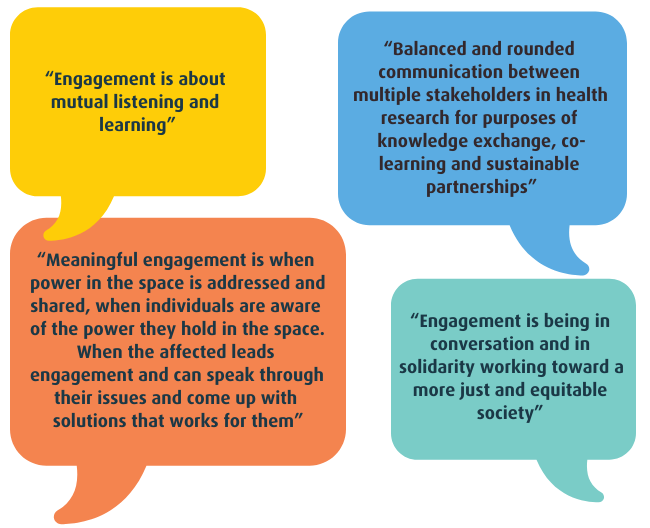Introduced by: Nabeel Petersen, Interfer, South Africa
In this first workshop in the Connectors 2021 series held in September 2021, we explored definitions of community and public engagement from different perspectives and how social action and research can be integrated through true community participation and co-production of knowledge.
Participants at the workshop shared their understandings of engagement and what they value about interdisciplinary collaboration in health engagement work. They also explored the role and benefits of Connectors in the process and the challenges that often arise. Artist Nicolene Louw created illustrations of the ideas as they were shared.
Session 1: Understanding and defining engagement
Guest facilitator: Gary Hickey, NIHR, UK
This introductory session looked at community/public engagement from a variety of perspectives and motivations. Gary Hickey from the UK's National Institute of Health Research (NIHR), introduced the session and briefly described NIHR's vision for community engagement and involvement in the global health research they support. The first three speakers then set the scene with their brief perspectives on engagement related to their areas of work.
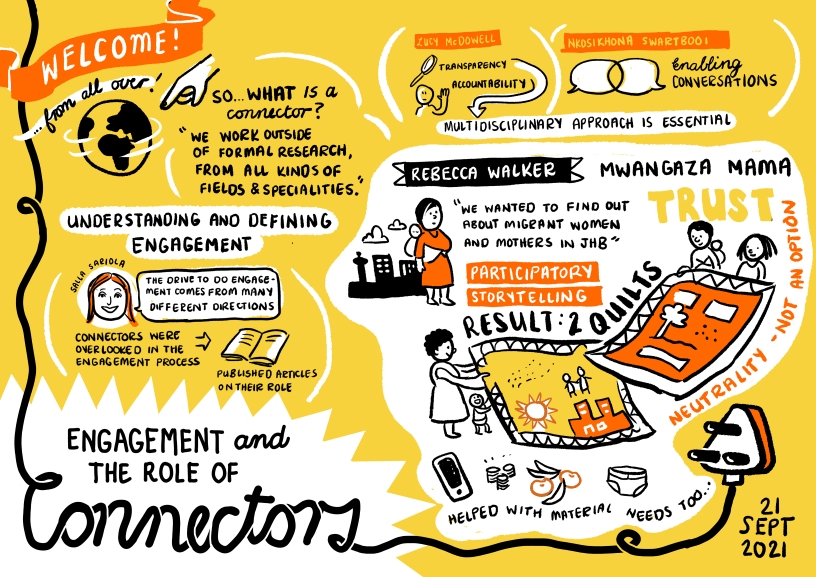
Salla Sariola, University of Helsinki, Finland is Senior Lecturer in Sociology and her research concerns the ethics and politics of biomedical research, as well as gender and sexuality, with fieldwork across South Asia and Africa. Salla shared her work on a book edited by herself and her colleague Lindsey Reynolds which looks at the ethical and political contexts in which engagement with global health research sits. She explained how, as part of their exploration, they had identified that the role of intermediaries or 'Connectors' was often overlooked within engagement activities. Salla went on to outline some postiive outcomes that Connectors can have, including building trust, bringing forward marginalised voices, addressing power differences and encouraging dialogue.
Lindsey Reynolds & Salla Sariola (2018) The ethics and politics of community engagement in global health research, Critical Public Health, 28:3, 257-268, DOI: 10.1080/09581596.2018.1449598. Full ebook is availabe for purchase.
Lucy McDowell, Wellcome, UK, is a Senior Public Participation Manager and she outlined Wellcome's interest in involving the public in solving global health challenges and particularly involving those communities most affected. She highlighed the importance of building trust and understanding between the research community and the public, and the role of connectors in this process. Lucy went on to discuss how engagement should enable transparency and accountablilty to the public, that it should allow research to be shaped by the public and ensure that it meets their needs. Lucy also said that research outcomes and public engagement outcomes should be meaningful and beneficial for the public, and that Connectors are fundamental to this work.
Wellcome is a global charitable foundation. They want everyone to benefit from science’s potential to improve health and save lives.
Nkosikhona Swartbooi, Social Justice Coalition (SJC), South Africa, described how our understanding of engagement should be derived from the communities we work with. For SJC engagement is about building people's power and activating their capacity to be able to address their issues by themselves. He said that it was important for SJC that they didn't take a 'parachute' approach where they establish themsleves as the answer to all the problems communities are facing. They work to bring communities together to discuss shared issues and the changes required to solve them. These conversations across communities and bringing those who are in a position of power to those conversations is fundamental to SJC's work.
The SJC is a democratic, mass-based social movement that campaigns for the advancement of the constitutional rights to life, dignity, equality, freedom and safety for all people, but especially those living in informal settlements across South Africa.
QUESTION: “What is engagement to you?”
Workshop participants were asked to briefly describe what engagement means to them. Read all their thought-provoking answers by clicking on the speech bubbles below [PDF 317KB]
CASE STUDY 1 - Co-production of knowledge: Mwangaza Mama
Rebecca Walker, African Centre for Migration & Society at Wits University, South Africa gave a case study presentation about Mwangaza Mama, a creative storytelling project that was undertaken in collaboration with a group of cross-border migrant women living in Johannesburg. This sensitive and thoughtful approach allowed the team to integrate social action with research in a ethos of true co-production of knowledge.
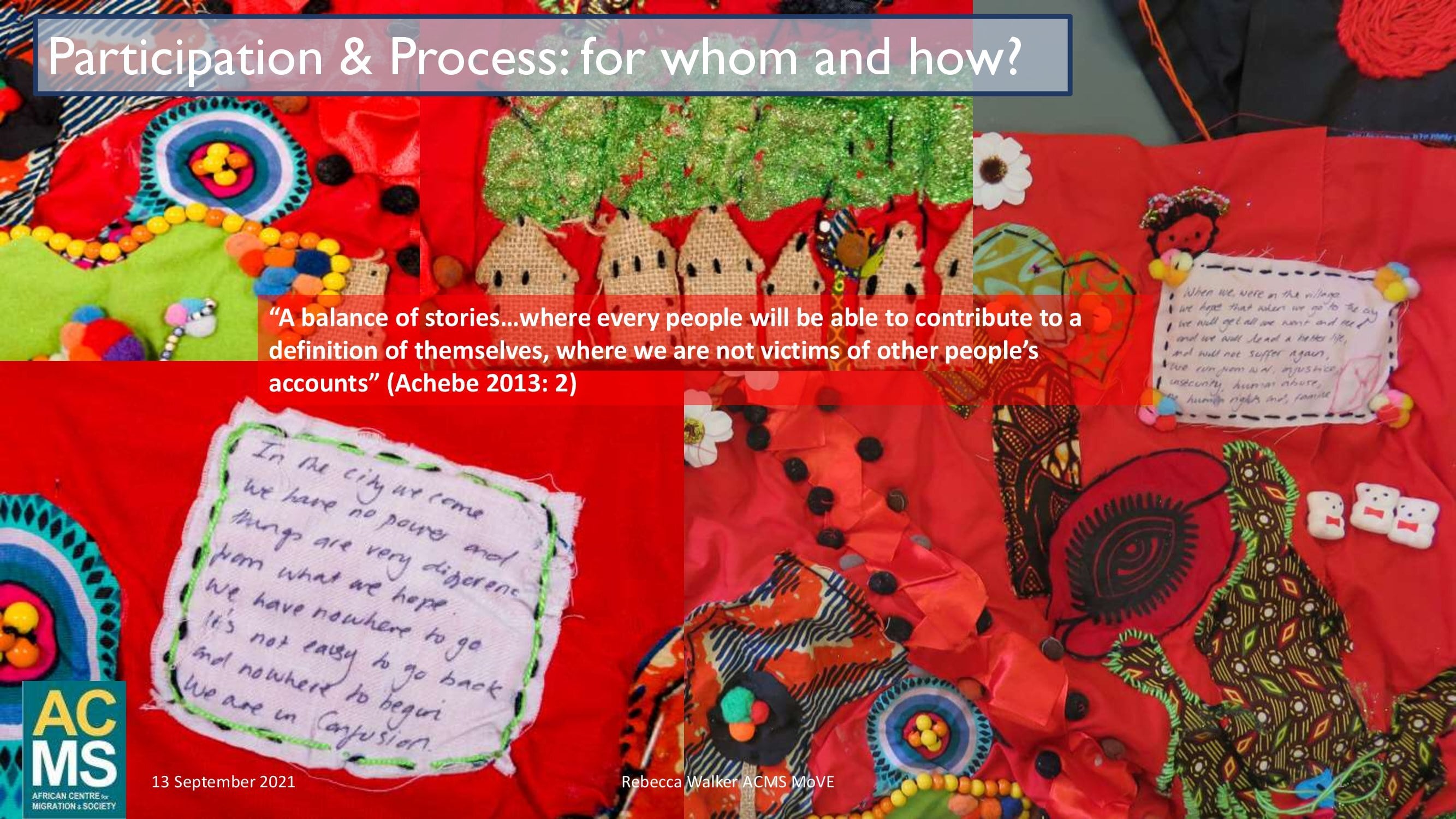
Access the beautiful Mwangaza Mama book for free online.
The African Centre for Migration & Society is Africa’s leading scholarly institution for research and teaching on human mobility dedicated to shaping global discourse on human mobility and social transformation.
FULL RECORDING OF SESSION 1
SESSION 2: Making the case for engagement and the role of the Connector
Guest facilitator: Sarah Iqbal, Independent Science Engagement Consultant, India
Our facilitator for the second session, Sarah Iqbal, gave workshop participants some background on her career and how she moved from being a researcher in biochemistry to become an engagement professional in India. Sarah described how, when she was doing her postdocutral research in the USA, she began to appreciate that public enagement could bring new view points to research questions. Sarah also described how she felt that engagement 'humanised' their research, making her feel more responsible for its outcomes and accountable to the community.
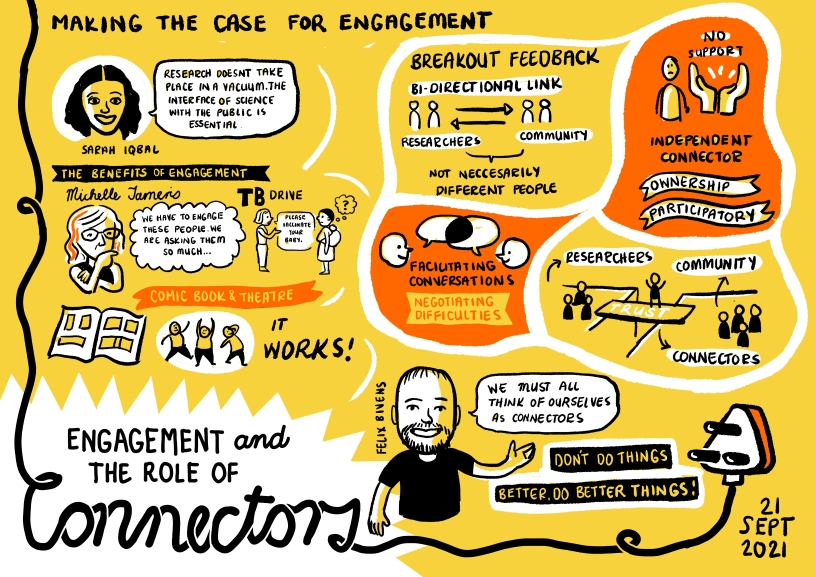
CASE STUDY 2 - Benefits and impact of engagement in TB research
Michele Tameris, South African Tuberculosis Vaccine Initiative (SATVI) at University of Cape Town, South Africa, gave the second case study presentation introducing SATVI’s creative engagement work and explained how they had started doing engagement back in 2008 whilst planning a phase 3 vaccine trial in young babies. Michele explained how they felt they were asking so much of the mothers of the children, and that they needed better ways of communicating clearly with them. They developed a comic book and touring theatre show to explore the issues and to engage local school students, and later pop-up street theatre and art to reach broader audiences.
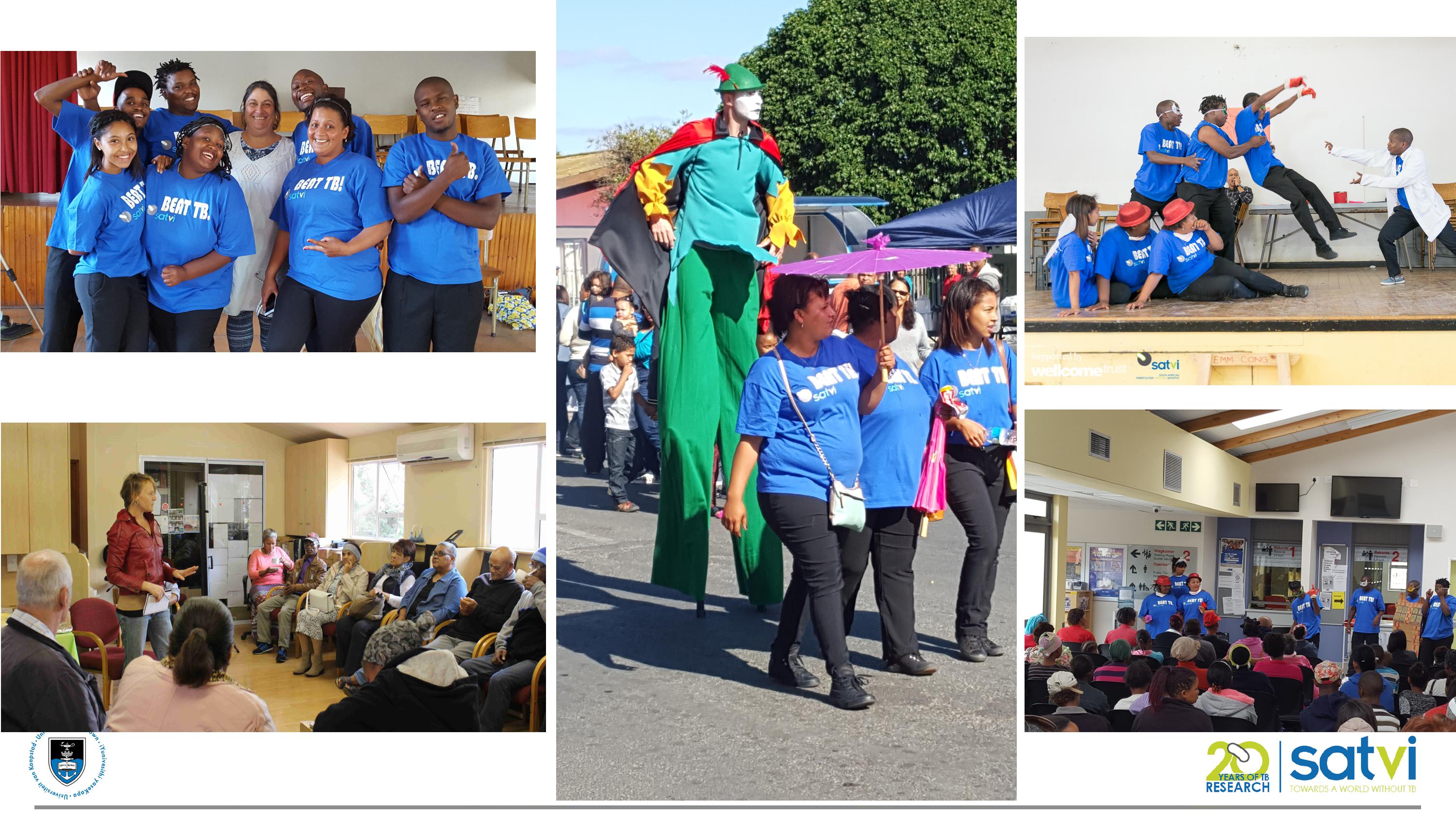
Find the documentary and series of digital stories about Beat TB on YouTube.
The South African Tuberculosis Vaccine Initiative (SATVI), is a world leader in TB vaccine clinical research located within the Health Sciences Faculty at the University of Cape Town.
SMALL GROUP DISCUSSIONS - Unpacking the role and value of the ‘Connector’
During the next session, workshop participants discussed two questions in small breakout groups to begin to explore the role of Connectors in engagement and how they can be supported. Below is a summary of some of the points emerging from these discussions:
QUESTION 1: “What roles and benefits do you think Connectors have in interdisciplinary collaboration in community engagement work?”
- Speak both languages - research and community - championing both causes
- Support transparency, information flow, and prevent miscommunication between researchers and communities
- Work to bring the ‘human’ to data
- Build trust, co-create knowledge and actively listen
- Bridge the gap between communities and researchers – helping each group to understand each other
- Educate researchers about the community, e.g. culture, values and beliefs, information flow from community to researchers
- Help with providing guidance to researchers in terms of language, format of communication, where to find people in that community and who should be engaged
- Educate community members and translate technical information
- Create a safer space and mitigate some hierarchies and stigma
- Increase understanding of stigmas in the local context
- Play an important role in policy making - they can engage with the community as well as more formal structures more effectively than the researchers.
"Being a Connector is a method of practice, that can be practical but also intellectual and philosophical"
QUESTION 2: “Have you experienced any challenges and what support structures do you think are needed?”
- Power dynamics can be a major problem! There is often a power imbalance in terms of expertise, who runs the project, who has the resources. This needs to be recognised, if not solved.
- It can be hard to translate the human experience into interventions e.g., with an issue like vaccine hesitancy
- Managing lots of different partners can be very complicated and use a lot of resources
- Defining what engagement really means can be challenging with different stakeholders
- Providing data to show impact - especially to funders – can be challenging
- How to clearly explain the value of public engagement
- Connectors come from different backgrounds and can perceived as an outsider in the team
- It is easy for there to be miscommunication between two groups – researchers, connectors, community and others
- Uncommunicated expectations can cause conflict, especially around payment and compensation for community
- Encouraging sustainability of the partnership
- Researchers can sometimes do more harm than good – we need effective training mechanisms in place to support them
- We need to prioritise communication and community engagement training and mentoring
Final reflections - Felix Bivens, Participatory Education and Research Advisor, USA
Felix gave his reflections on the discussions during the first workshop. He described his work researching community engagement as a space for higher education as a whole to become more enlightened, connected and supportive of civil society. Felix reflected on the value of thinking about how we can all embody some of the roles of 'Connector' including balancing power and changing the structures of inequality - through self-reflection and action. He encouraged being more ambitous in an effort to not just do things better but to do better things. Felix suggested we could move things forward by not just focussing on bringing research into the communities but by ensuring the community could play a deeper role within research institutions and structures - thus making our work transformative at a systems level in terms of research culture.
The Regenerative School works to catalyse transformative learning to build a more just, peaceful, and sustainable world. Find Resources authored by Felix and his colleagues.
FULL RECORDING OF SESSION 2
Graphic illustrations | Nicolene Louw, Fine Line, South Africa
Return to the Connectors main page
This work is licensed under a Creative Commons Attribution 4.0 International License

